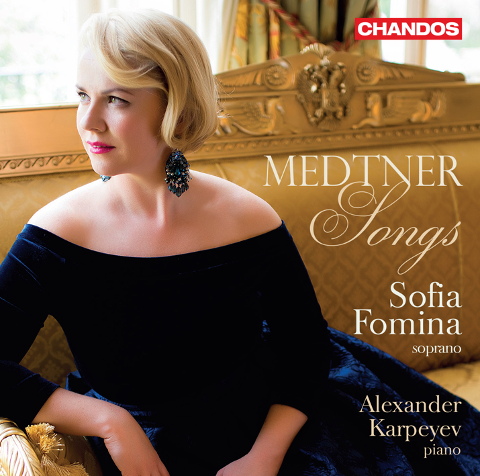Medtner Songs
Medtner’s Melodic Tapestry: A Captivating Journey Through Song
March 2021
Nikolai Medtner’s exquisite songs, presented by soprano Sofia Fomina and pianist Alexander Karpeyev, showcase a compelling blend of Eastern and Western influences in a collection that transports listeners through the realms of Russian and German literature. The album offers a thoughtful exploration of Medtner’s artistry, where both instruments merge to create a refined and creative dialogue.
The Op. 36 set, featuring Six Poems by A. Pushkin, serves as a mesmerizing introduction to Medtner’s profound artistry. An exquisite interplay between Fomina’s soprano and Karpeyev’s piano brings to life the harmonic journey of “The Angel,” evoking echoes of Rachmaninoff’s brilliance. This duet embodies the central dichotomy of the poem, seamlessly intertwining vocal and piano lines with a touch of individuality. Fomina’s spirited spontaneity in “The Flower” is beautifully complemented by Karpeyev’s climactic piano, infused with a brief but captivating sense of mysticism.
“Spanish Romance,” built on Pushkin’s terse verses, reveals Medtner’s ability to weave textures that mirror gaiety and dreaminess. Fomina and Karpeyev’s artistry paints a vivid picture of a warm Spanish night, where the soprano’s versatile interpretation captures moments of soothing tranquility and tempestuous passion. The Op. 46 Seven Lieder, inspired by Medtner’s German roots, unveils a more subtle palette. “Hallowed Place” showcases Fomina’s resonant grace, harmonizing beautifully with Karpeyev’s translucent and whimsical piano.
The album’s pinnacle arrives with “Winter Night,” a hauntingly intense performance. Fomina expertly navigates through the emotions, from hopeful comfort to cataclysmic anticipation, while Karpeyev’s piano conjures a chilling winter landscape punctuated by crystalline and menacing dissonances. The cathartic “Spring” that ensues is a juxtaposition of lightheartedness and perpetual sadness, masterfully capturing Medtner’s irony.
Notably, “Sleeplessness” from Op. 37 stands out, as Fomina’s husky lower register melds seamlessly with Karpeyev’s brooding piano, breathing life into Medtner’s listless harmonies.
Recorded at Wyastone Concert Hall in the UK, the album offers a live feel, though the balance at times struggles to accommodate the intricate interplay of Medtner’s piano and vocal nuances. While minor missteps exist, the album’s liner notes provide a deeper understanding of Medtner’s influences and compositional style.
In conclusion, “Medtner – Songs – Sofia Fomina, Alexander Karpeyev” is a compelling testament to the convergence of Medtner’s heritage and artistry. Fomina and Karpeyev’s collaborative efforts bring these compositions to life, despite occasional balance challenges. With its rich tapestry of emotions and nuanced performances, this release undoubtedly merits a place in the collection of any true song enthusiast, shedding light on the profound beauty of Medtner’s musical legacy.

